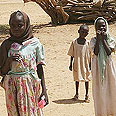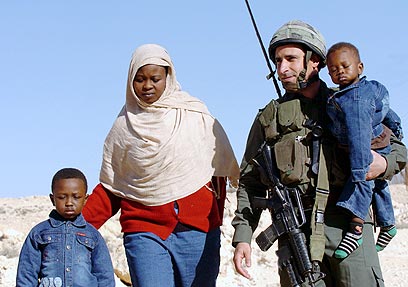
'Give them a feeling of home.' Girls in Darfur
צילום: איי פי
Take me under your wing
Eleven young women and 18 of their children are living in a shelter in a community in the Carmel region. The only difference between them and the rest of the residents is their origin: They have all escaped from the terror of genocide in Darfur, they have all somehow infiltrated into Israel and left behind families that they will never see again. A visit to the only place in Israel that gives them hope
The unbelievable story of the women’s shelter that in the past few months has served as the home for a group of Sudanese refugees that survived the genocide that is taking place in Darfur began with a telephone call.
“We have a young Sudanese woman who illegally crossed the border from Egypt, she is pregnant and has a child, if you do not take her, we will be forced to separate them”, reported a worker at the organization “Hotline for Foreign Workers” to Rita, the head of the shelter who requested not to publicize her full name. Without knowing too much about the massacres that were occurring in Sudan, Rita accepted the request.
“Since then, many telephone calls came our way”, she describes. “Immediately after the first refugee, we received the second, a nineteen year old woman in the advanced stages of pregnancy, who started having labor pains after she crossed the border.
"She arrived at the shelter in serious condition after the traumas she experienced in Sudan and Egypt. Her husband, who escaped with her, was sent to an Israeli prison. In the first few weeks, she slept with the woman who came before her out of fear. After these two, many more refugees from Darfur arrived”.
Eleven young woman, girls really, and 18 of their children are living today in an eight room building situated in a community in the Carmel region. In this shelter which has become their home, they are leading complicated lives of detachment and loneliness in a foreign country, they are coping with the traumas of their past and with the troubles of their present, and trying to find a small corner for themselves in this crowded house.
The volunteers who help run the shelter have meager resources to provide for the needs of these young women. Yet plentiful shared meals are provided regularly, holidays and birthdays are celebrated together, and despite the severe crowding the place is spotless and gleaming.

Sudanese refugee and her children on Israel-Egypt border (Photo: Meir Azulay)
In the first months, Rita recalls, she did not know a thing about the women who were so different from the population to which she was accustomed.
“I was surprised to find out that some of them were Christian, and not all Muslims. I had no idea how many more would come, how many had already come, what they would have and how long they would stay here”, she retells.
“The house is not big, and yet we decided in consultation with the woman who were already living here, to accept more refugees. Despite the congestion and that the house is completely full, every call from the army, police or hotline is answered. True, there is never enough, but my faith in G-d helps me believe that we will be able to hold on”.
'Whoever was left behind is lost to her'
Rita, married with two grown children, emigrated from the United States nineteen years ago “out of the belief in the holiness of Israel”. She has run the shelter, a private initiative that does not receive support from the government and is dependent on donations, for the past four years.
“As Jews we have an obligation to be a light unto the nations, literally to show the world the correct path”, she explains when she is asked how she became the only address for Sudanese refugees in Israel.
“The state claims that the refugees are a security threat because they are citizens of an enemy country, and I want to mention that during the Holocaust Jewish refugees were turned away from numerous countries with the excuse that they were German citizens. We cannot forget that we are talking about human beings, even if their religion and skin color is different. We have to give them the opportunity to continue on with their lives and overcome what they have lived through”.
She is giving this opportunity to the young girls in her auspices, and is doing her all to ease their lives in this country, which they had never heard of before fleeing here. “I think of this place as a refuge and a recovery place, not just a shelter”, she states.
“It is important for me to give them as much as possible a feeling of home, even though there are many things, physically and emotionally, that I want to give them but can not. During the war, for example, a few shells landed near here. I could not help but think what they were feeling as they ran to the shelters with their children. Did it return them to their earlier traumas? To the feeling of running from a war, and from the bullets chasing after them?”
How are they adjusting to their lives in Israel?
“The most important thing for them is education. They want to send their children to kindergarten and to school and to learn Hebrew. They all willingly learn about Judaism
and the traditions of the Jewish people, and every Friday we have a Shabbat party.
"They also want to go to work, and are always asking me to try to arrange work for them. Every visitor is inundated with questions, maybe he has news from their husbands in prison, or knows when they will be allowed to go to work.”
Rita’s eyes, which have already seen a lot, become shocked when she recalls how a representative from the Red Cross came to visit the shelter and gave out phone cards to the girls so that they could call their families left behind in Sudan. The calls went through Switzerland, she explains, so that the local authorities would not know that the calls came from Israel.
“The next morning, the phone company called me to tell me that the night before a thousand shekels worth of phone calls were made to Switzerland”, she says. “At first I was shocked, because that is a large amount for us. But then I understood that these girls would never again see those who remained from their families. They can never go back to Sudan, and whoever stayed behind is lost to them. I decided that a thousand shekels is a small price for those conversations”.
- The shelter subsists solely on donations and needs all possible supplies: baby supplies such as blankets, sheets, clothing, cribs and carriages; a dryer; toys; and books in Arabic and English ,and Hebrew and English school books. To donate, email [email protected]










